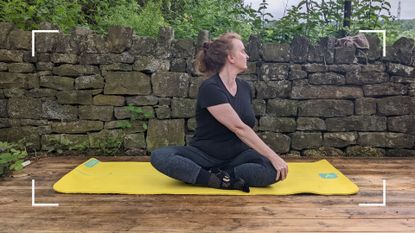I tried doing yoga every day - here are all the surprising benefits I found after just two weeks
Doing yoga every day can improve your mental health, posture, and fitness, as writer Samantha Priestley found out with this two-week challenge


Sign up to our free daily email for the latest royal and entertainment news, interesting opinion, expert advice on styling and beauty trends, and no-nonsense guides to the health and wellness questions you want answered.
Thank you for signing up to Woman & Home. You will receive a verification email shortly.
There was a problem. Please refresh the page and try again.
Yoga every day might seem like one of the more gentle exercises you can do, and it is, but practicing yoga every day also has a ton of health benefits that make it a great activity for improving your fitness.
For someone who never did much exercise when they were younger, yoga was something of a gateway workout for me. I always enjoyed swimming and walking, but I didn’t like the idea of taking a class or going to the gym. When I discovered yoga, all that changed and I began to view exercise differently. I really liked the meditative aspect of it, along with the gentler flow, and I soon found out how good proper stretching felt. This was crucial for me as I’d always previously struggled to find the mental link between exercise and feeling good in my body.
I liked how yoga made me feel, so I progressed pretty quickly with a handful of online videos and yoga apps. Then something happened that I'd never experienced with any other exercise: On the days I didn’t practice yoga I found that I missed it and my body felt like it needed it. This was a ground-breaking moment.
So, I recently decided to take on the challenge of doing yoga every day for two weeks to see what would happen. Were there even more benefits of yoga to be had? With my best yoga mat in hand, I tried it out, and here's what I discovered.
Benefits of doing yoga every day
1. Yoga can bring mental clarity
I enjoy running and walking as these exercises allow me to get outdoors, which helps to relieve stress and anxiety. But yoga (even yoga for beginners) brings a kind of mental calmness and focus I haven't experienced with any other form of exercise.
In my experience, I've found you don't need to do yoga every day to get this benefit, but having the regular program and time pre-set aside certainly helped me to find a quiet moment during each day and maintain an almost meditative consistency.
"Many of my clients have also reported that daily yoga practice helps them think outside the box, sparks their creativity, and improves their problem-solving skills," says Mike Julom, an ACE-certified PT and CrossFit trainer. "This can be attributed to the meditative aspects of yoga, which clear the mind, enhance concentration, and promote a fresh perspective."
And these meditative aspects of yoga are invaluable, a review by Harvard Medical School found. In looking across several studies and further contributing to that research, scientists confirmed that regular yoga practice can boost memory function, improve sleep quality, and even lessen symptoms of depression.
2. Yoga can aid digestion
This was a surprising one for me and something I would never have thought about before, but it makes sense. Any form of exercise can help with digestion as it improves circulation and gut motility while decreasing stress, but yoga - particularly child's pose and garland pose - has the added benefit of encouraging you to move in ways you normally wouldn't.
This helps these processes move along a little quicker, says Julom. “You wouldn't necessarily think that twisting your body into pretzel-like shapes could help your digestion, but it can. Certain yoga poses stimulate the digestive organs, improving their function and easing discomfort associated with digestion issues.”

3. Yoga can reduce stress
I have no doubt that practicing yoga every day for two weeks has reduced my stress levels. Undoubtedly, a lot of this will be due to the breathing exercises that are part of any yoga routine, since the simple act of deep breathing and being mindful of your breathing brings a sense of calmness.
When I’m deep into my yoga session I’m not worrying about what's ahead of me for the week or even for the rest of the day. I’m not thinking about any problems or any issues I have to deal with, I’m just breathing.
This is a huge advantage for me, and one of the reasons why I may continue to do yoga every day, as noticeably reducing your stress levels has so many advantages in itself. Not only do you avoid the potentially-dangerous mental and physical side effects of stress like habitual burnout, but I've also learned you can actively improve some of your body's essential processes by lowering your stress levels.
For example, research (from University Hospital Zurich) has shown a link between lower stress levels and a better-functioning immune system. "Practicing yoga daily can help boost the immune system, making it more efficient at warding off diseases,” agrees Julom. “Yoga reduces stress and inflammation in the body, which is linked to immune system dysfunction. After just two weeks of daily practice, you might find yourself feeling stronger and healthier, and perhaps even getting over the common cold quicker.”
Of course, having only practiced yoga for two weeks, I can't say what kind of long-term effect this will have on my immune system. I think I'd need to keep it up for much longer to be sure, but I do feel generally healthier and stronger with less stress weighing on my mind.
4. Practising yoga every day for two weeks will improve your balance
When you think about some of the one-legged yoga poses like the one-legged prayer pose, it’s not surprising daily yoga practice can help with balance. This was one of the many benefits of regular practice I was keen to see for myself as well. As a menopausal woman over 50, I had noticed my balance wasn’t what it used to be, and I wanted to address this.
But yoga doesn’t only improve physical balance, as Julom explains. “Yoga's impact on balance extends beyond the physical. Yes, you'll likely become more adept at holding those tricky one-legged poses, but you'll also start to notice a sense of emotional balance permeating your life. This emotional stability can lead to improved relationships, better work performance, and an overall increased sense of wellbeing." That's a win-win in my books.

5. Yoga improved my posture
Another surprising side effect for me was an improvement in my posture. Spending every day hunched over a computer often gives me neck and backache, which is uncomfortable at best.
After two weeks of yoga, my aches and pains had gone and I was naturally sitting more upright. I felt more supple, my general mobility was much better, and I felt brighter, instead of sluggish as I had before.
Is it enough to do yoga every day?
For me, personally, it isn’t enough to just do yoga every day. One of the reasons I regularly exercise is to help me feel strong and keep aching joints (one of the symptoms of menopause) at bay. To do this, I incorporate running and strength training into my weekly routine. Over the two weeks, I kept this up and really felt the benefit of doing so.
But what works for me won't always work for someone else. For some people, daily yoga might be enough. As Anna Passalacqua, a certified yoga teacher and C-IAYT yoga therapist explains, “You can experience physical, mental, and emotional benefits just from practicing yoga. It is not necessary to do other exercises in order to benefit from yoga. However, depending on your goals, you may be able to accomplish more by incorporating other activities.”
When it comes to the particular benefits of regular yoga practice, like learning how to deal with stress, Julom believes yoga is part of the answer - but an all-around approach is needed. “It's important to view it as part of a holistic approach to stress management. This approach should ideally also encompass a balanced diet, sufficient sleep, healthy social connections, and potentially other stress-relief techniques like meditation, breathing exercises, or other forms of exercise that you enjoy. It's also crucial to address significant sources of stress, whether they're workload, relationship issues, or health concerns.”
Is it OK to do the same yoga routine every day?
When I first started practicing, I did yoga as a workout in the same way regularly. But when it came to starting my daily challenge, I decided to follow a program that changed every day. For me, this was about progressing and getting better at yoga, since the poses got harder as the two weeks went on, and not getting bored with doing the same routine every day.
Julom agrees that changing things up is often for the best. “Variety keeps your practice interesting, stimulating, and challenging, which can help keep you motivated and engaged.”
Plus, changing up your routine will avoid putting pressure on the same muscles in the body every day. While there are advantages to doing this for some people, especially those new to the practice, looking to do yoga or Pilates for strength training, variety is more likely to keep you injury-free as you progress.
“If you’re focusing on learning the fundamentals or you have a favorite yoga routine that works well for you, there’s nothing wrong with doing the same sequence every day," Passalacqua, who is also the co-founder of Breathing Deeply, says. "Just make sure you don’t overdo it and hurt yourself. Pay attention to the signals from your body and stop if something hurts or doesn’t feel right. Doing different yoga poses can help make sure you exercise all of your different muscle groups and don’t overwork the same ones.”
woman&home newsletter
Sign up to our free daily email for the latest royal and entertainment news, interesting opinion, expert advice on styling and beauty trends, and no-nonsense guides to the health and wellness questions you want answered.
Samantha is a freelance writer from Yorkshire, writing about health and wellbeing for Woman & Home, Reader's Digest, Giddy, and Good Housekeeping. For the past 15 years, she's combined her personal experiences with reporting, to write about menopause, fitness, sleep, and healthy eating. She also writes about travel and food and drink for The Independent, The Good food Guide, Lonely Planet, Frommer's, and more.
-
-
 Remembering the time Queen Elizabeth sent the most powerful feminist message in her classic subtle style while at Balmoral
Remembering the time Queen Elizabeth sent the most powerful feminist message in her classic subtle style while at BalmoralWith the Royal Family pictured at Balmoral for the first time since the late Queen died, we revisit one of our favourite stories
By Jack Slater Published
-
 This royal couple is 'most valuable' - surpassing the likes of Beyoncé and Jay-Z and Jlo and Ben Affleck
This royal couple is 'most valuable' - surpassing the likes of Beyoncé and Jay-Z and Jlo and Ben AffleckA new study has found the value in news items and media clicks different couples generate
By Jack Slater Published

